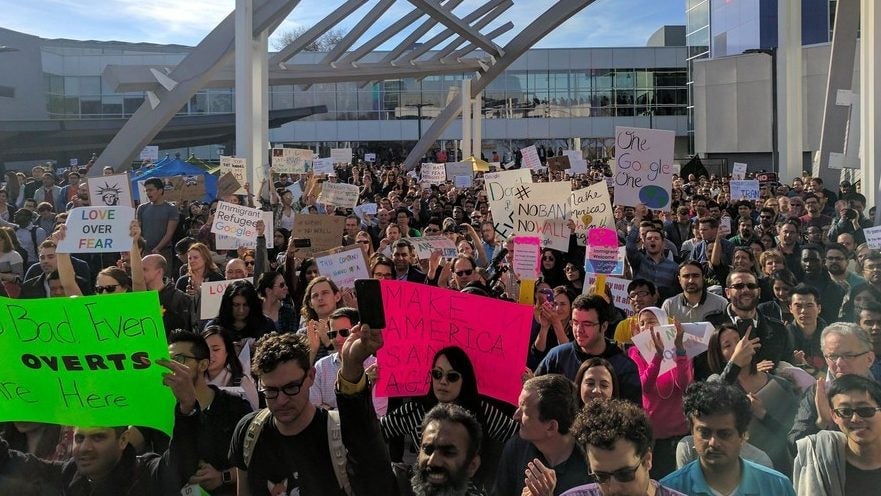Silicon Valley’s backlash against Trump is being led by employees
Political frustrations in Silicon Valley are boiling over. Protests and walkouts have erupted on Bay Area campuses ranging from Google to Palantir and while management is often in attendance—Google CEO Sundar Pichai and co-founder Sergey Brin have both participated in demonstrations—tech employees are leading the charge.


Political frustrations in Silicon Valley are boiling over. Protests and walkouts have erupted on Bay Area campuses ranging from Google to Palantir and while management is often in attendance—Google CEO Sundar Pichai and co-founder Sergey Brin have both participated in demonstrations—tech employees are leading the charge.
The groups behind tech’s Trump backlash are barely older than the policies they’re combating: The president’s executive order on immigration is only two weeks old, and most of the anti-Trump activity is being organized by outfits that were started only a few months ago. But already, these groups have funneled tech employees’ frustration with Trump into actionable ideas.
“We’re a huge industry,” says Optimizely software engineer Brad Taylor, whose Facebook post urging tech workers to organize went viral in late January, leading to the formation of Tech Against Trump. “If we can unify together as an industry, it will be a lot harder for Donald trump to ignore us.”
Taylor took to Facebook to suggest a massive tech-employee walkout on March 14; the rallying cry was quickly picked up by supporters that included Nest product lead Mark Rose. As of Feb. 7, more than 1,2000 had RSVPd yes on Facebook. Other grassroots groups, like Tech Solidarity, are also getting in on the action.
Silicon Valley’s frustration has also played out at individual companies. On Jan. 30, more than 2,000 of Google’s 60,000 employees staged a walkout to protest Trump’s temporary travel ban. Facebook’s employees have committed to flying less or not at all for the 90-day period that the ban encompasses. On Jan. 18, tech workers rallied outside Palantir, a government contractor co-founded by PayPal founder and Trump advisor Peter Thiel. Employees at smaller startups like Spotify, Etsy, and Warby Parker also joined a demonstration last week, organized by Amnesty International.
At Uber, CEO Travis Kalanick withdrew from the president’s economic advisory council—and announced a $3 million legal defense fund for drivers affected by the immigration order—after the company was hit with a massive (and some argue unfair) Trump-related #DeleteUber campaign. In an email to employees, Kalanick wrote that “joining the [council] was not meant to be an endorsement of the President or his agenda but unfortunately it has been misinterpreted to be exactly that.”
Other tech companies have been more discreetly supportive. Cable provider Comcast, for instance, did not issue a public response to Trump’s executive order, but it did continue to pay the 1,200-plus Philadelphia Comcast employees who spent their work hours protesting the order on Feb. 2. Comcast workers in Washington, DC, and Sunnyvale, California, also walked out.
After days of rising tensions, tech CEOs finally threw down their own gauntlet this week, particularly as it became clear that Trump’s immigrations plans might derail their reliance on visas to attract top foreign talent. At least 98 companies have now signed a legal brief opposing Trump’s travel ban, among them Apple, Google, eBay, Facebook, Intel, Microsoft, Netflix, Salesforce, Twitter, and Uber. In their brief, the companies argue that “the problems that render the Executive Order harmful to businesses and their employees also make it unlawful.”
Valerie Aurora, a former Intel engineer and activist in Silicon Valley, says the building momentum will be “impossible for tech companies’ management to walk back.” CEOs reactions, both public and private, to further Trump administration declarations will be closely scrutinized by both employees and the public at large.
“It feel like the tipping point was last week,”Aurora says. “I’m sad that it took this direct threat to the business models for direct management to act, but the workers were already there.”